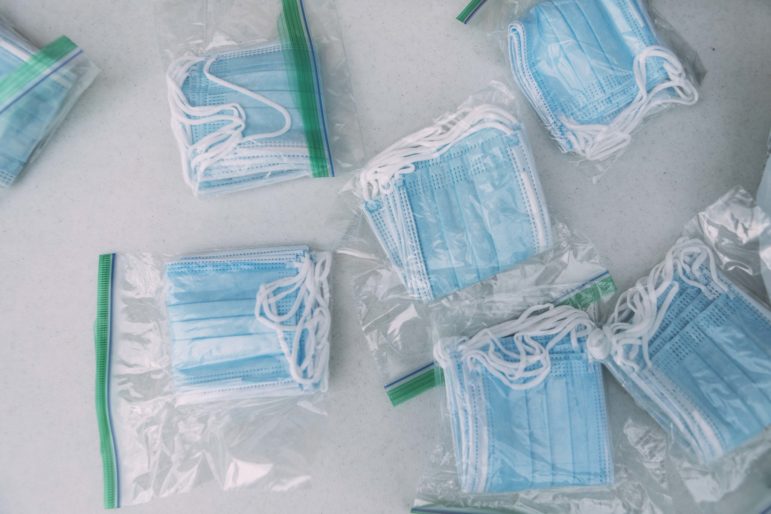“We have all been on our path to accepting COVID-19 as a part of our lives, but let’s not forget that the stakes are higher for some.”

Emil Cohen/NYC Council
As a pediatric psychologist working with children and families, and as a working mom of a young child, I have appreciated the attention paid to immense stress experienced by parents throughout the pandemic as well as the rampant mental health crisis in this country. However, the unique experience of parents and caregivers of children with special healthcare needs, including complicated medical conditions, has received little attention.
In recent months, as the state of New York has worked toward eliminating mask mandates, and as a federal court struck down the CDC’s requirement for masks on planes and other forms of public transit, caregivers have told me that they feel forgotten and alone with their fears. Recently, on the same day, two caregivers talked about being filled with anxiety and paralyzed in decision making, while feeling like the world around them is racing ahead to “normal.” They aren’t alone.
Pediatric medical conditions vary widely in their treatment and prognosis, but some children require daily treatments, frequent visits to pediatric subspecialists or hospitals, and management of side effects such as nausea, pain, and fatigue to name a few. Children may need special education accommodations or additional therapies to support their development and health. Caregiving involves managing each of these needs, which can result in less availability to other children, financial burden due to treatment costs or reduced opportunity to work, and their own physical health problems. Not surprisingly, caregivers are at increased risk for mental health conditions such as anxiety, depression, and traumatic stress.
Throughout the pandemic, decision-making for all parents has been difficult. The past two years has required almost constant risk vs. benefit analysis based on, at times, unclear or conflicting information and moving data points. Every family has their own degree of risk acceptance. Do you allow your unvaccinated child to socialize in a small or large group? Is my child’s school using strong safety protocols? Do you gather as a family for holidays and traditions? How does vaccination status affect your choices? The CDC offers guidelines for families to consider when making these decisions.
Now imagine being the caregiver of a chronically ill child and facing these same issues. It’s estimated that about 2.6 percent of children in the U.S. are immunocompromised, which based on current population estimates, is roughly 1.9 million children. I work with many parents whose children have cancer and are treated with chemotherapy, which typically results in a compromised immune system. They are advised, at the start of treatment, to do what they can to prevent their child from contracting illnesses such as the common cold. In fact, this is one of the very few things they might feel like they have some control over. Sanitize, avoid crowded places, and reschedule visits from guests who are ill. The bottom line: avoid illness the best you can.
Recently, the parent of an immunocompromised child told me that if mask mandates are removed from their child’s school, the child would be unable to attend for the rest of the school year, perpetuating their isolation and reducing the quality of their education.
Avoiding illness has felt like no easy feat for children with complex medical issues during the last two years. Caregivers have been told that children carry less viral load, are less susceptible to acquiring COVID-19, or present with more mild symptoms. More recently, the good news about the Omicron variant is that despite being highly contagious, it usually causes less severe disease. Most parents can be reassured that the majority of children are relatively safe, and odds are if they contract COVID-19 they will fare well.
But this isn’t always the case. Individuals with pre-existing conditions are at greater risk for complications from COVID-19. This has been highlighted by the incidence of Multisystem Inflammatory Syndrome in Children (MIS-C) or the fact that some children, even if not the majority, do experience serious symptoms and can be hospitalized or even die from complications related to COVID-19. Recent changes in eliminating mask mandates in schools heightens anxiety and complicates the picture even further for caregivers of ill children.
Caregivers of medically complex children know that their children might be in the minority, especially those not yet eligible for vaccination or who cannot reliably wear a mask. For most, protecting their child from illness has been paramount. Yet, caregivers are also keenly aware of how necessary balancing mental health and a sense of normalcy is too. The isolation, educational disruption, stress, and trauma has caused a concerning uptick in mental health challenges for youth. Families with more than one child must also contend with protecting the mental health of healthy siblings, accepting that the more freedom they are given, the greater the risk of exposure to illness to the ill child. At the height of the pandemic, some families of ill children even expressed the hospitals they visit often were no longer perceived as safe places.
In New York City, mask mandates for preschoolers, who are not yet eligible for vaccination, continue. Currently, rates of COVID-19 are rising again thanks to especially contagious variants. We’re all still riding the roller coaster of the pandemic, but the dips and valleys are experienced by caregivers of ill children in a unique way.
We have all been on our path to accepting COVID-19 as a part of our lives, but let’s not forget that the stakes are higher for some. Things like respite care, paid family leave, and access to affordable mental health treatment have always been needed by caregivers but are now more necessary than ever. And we can each do our part by supporting the caregivers in our lives with kindness, empathy, and understanding.
Dr. Salley is a pediatric psychologist working with children who face serious medical conditions, and their caregivers, in New York City.








